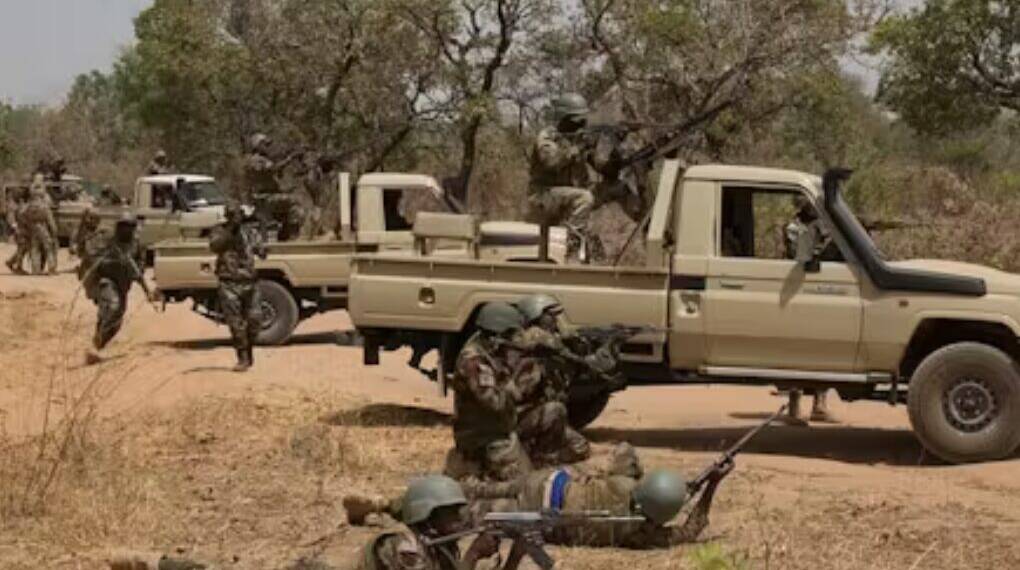The Sahel region of West Africa is now home to one of the world’s most dangerous jihadist insurgencies: Jama’at Nusrat al-Islam wal-Muslimin (JNIM), an al-Qaeda affiliate that has rapidly evolved from a coalition of local militants into a proto-state actor with global significance.
Understanding how JNIM rose to such prominence—and why it has proven so difficult to defeat—requires examining its origins, strategies, and the failures of both local and international responses.
Origins: From Fragmented Militancy to a Unified Front
JNIM was formed in 2017 in Mali, emerging from the merger of five militant groups: Ansar Dine, Katibat Macina, Al-Mourabitoun, Ansar al-Islam, and the Sahara branch of al-Qaeda in the Islamic Maghreb.
This coalition was a strategic response to French military interventions that had pushed jihadist and separatist groups out of northern Mali in 2012. By uniting, these factions pooled resources, leadership, and operational capacity, creating a more resilient and adaptable organization.
The group’s leadership reflects the region’s ethnic complexities. Iyad Ag Ghali, a Tuareg and former Malian diplomat who led the 2012 Tuareg rebellion, serves as JNIM’s leader, while his deputy, Amadou Koufa, hails from the Fulani community.
This diversity has allowed JNIM to tap into local grievances across multiple communities, broadening its recruitment base and legitimacy.
Also Read: Foreign western powers looking to break Sahel alliance in Africa
Expansion and Tactics: From Mali to the Wider Sahel
JNIM’s operational footprint has expanded dramatically. While its origins are in central and northern Mali, the group now operates across Burkina Faso, Niger, and into coastal states like Benin and Togo. In the past year alone, JNIM has claimed responsibility for hundreds of attacks, including a major coordinated assault on seven military sites in western Mali in July 2025.
The group’s tactics are both brutal and strategic. JNIM employs improvised explosive devices (IEDs), ambushes, and direct assaults on military bases, often seizing weapons and supplies in the process.
Civilians are also targeted—especially those suspected of collaborating with government forces—but JNIM’s violence is often calibrated to maximize disruption and sow fear while avoiding alienating potential supporters.
In some areas, the group imposes strict Sharia law, enforcing dress codes, banning music and smoking, and restricting women’s movement, but it also exploits local disillusionment with corrupt or absent state authorities.
Governance and Proto-State Ambitions
What sets JNIM apart from many other militant groups is its ability to act as a quasi-government in areas under its control. The group collects taxes on goods, gold, and even cattle, and imposes extortion “protection” fees on locals.
In some regions, it has established Sharia courts, offering a form of justice that, while harsh, is sometimes seen as more predictable than the state’s secular system—especially in places where state authority is weak or abusive.
This proto-state model is not just about violence; it’s about embedding the group within local economies and societies. JNIM’s leaders have learned from the failures of other jihadist groups, focusing on building relationships with communities—sometimes through coercion, sometimes by exploiting grievances against the state or rival ethnic groups.
Recruitment and Funding: Exploiting Poverty and Grievance
JNIM’s ranks are estimated to number several thousand fighters, many of them young men and boys from some of the world’s poorest communities. Recruitment is fueled by a toxic mix of economic desperation, ethnic marginalization, and anger at state abuses.
The group’s ability to embed itself in local communities—especially among the Fulani, who have often been targeted by state-backed militias—has been a key factor in its growth.
Financially, JNIM is highly adaptable. While kidnapping for ransom was once a major revenue source, the group now relies heavily on cattle rustling, taxation of local economies (including gold mining), and extortion.
In one district of Mali, JNIM reportedly earned $770,000 from livestock theft in a single year, and its total income from such activities likely runs into the millions.
The group has also exploited new technologies, such as satellite internet from Starlink, to coordinate attacks and maintain communications even in remote areas.
Also Read:
The Role of State Failure and International Response
The inability of West African states to provide security and effective governance has been a boon for JNIM. Military coups in Mali (2020, 2021), Burkina Faso (2022), and Niger (2023) were, in part, a response to the failure of civilian governments to contain jihadist violence.
Yet, the juntas that replaced them have fared no better. In many cases, their own abuses—particularly against Fulani civilians—have driven more recruits into JNIM’s ranks.
International efforts have also faltered. French and UN peacekeeping missions succeeded in pushing militants out of some areas but failed to address the underlying drivers of conflict.
The withdrawal of French troops and the collapse of regional security alliances have left a vacuum that JNIM has eagerly filled. Meanwhile, the United States has largely disengaged, leaving local actors with little external support.
The Human Toll and Regional Implications
The consequences of JNIM’s rise are devastating. In the first half of 2025 alone, the group claimed responsibility for over 280 attacks in Burkina Faso, double the previous year’s figure, with nearly 1,000 people killed across the region—most of them security personnel or members of anti-jihadist militias.
The violence has displaced millions, destabilized entire countries, and created fertile ground for further radicalization and criminality.
A Crisis of Governance and Security
JNIM’s transformation into one of Africa’s deadliest militant groups is the product of local grievances, state failure, and the adaptive strategies of a savvy leadership. Its ability to act as both a violent insurgency and a shadow government has allowed it to thrive where both civilian and military authorities have failed.
Unless regional governments and international partners can address the root causes of insecurity—poverty, marginalization, and state abuse—JNIM’s influence is likely to grow, threatening not only the Sahel but the stability of West Africa as a whole.








